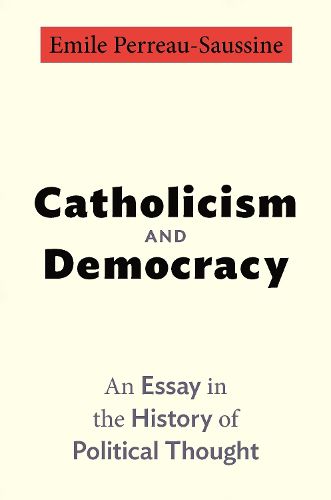Readings Newsletter
Become a Readings Member to make your shopping experience even easier.
Sign in or sign up for free!
You’re not far away from qualifying for FREE standard shipping within Australia
You’ve qualified for FREE standard shipping within Australia
The cart is loading…






Catholicism and Democracy is a history of Catholic political thinking from the French Revolution to the present day. Emile Perreau-Saussine investigates the church's response to liberal democracy, a political system for which the church was utterly unprepared. Looking at leading philosophers and political theologians--among them Joseph de Maistre, Alexis de Tocqueville, and Charles Peguy--Perreau-Saussine shows how the church redefined its relationship to the State in the long wake of the French Revolution. Disenfranchised by the fall of the monarchy, the church in France at first embraced that most conservative of ideologies, "ultramontanism" (an emphasis on the central role of the papacy). Catholics whose church had lost its national status henceforth looked to the papacy for spiritual authority. Perreau-Saussine argues that this move paradoxically combined a fundamental repudiation of the liberal political order with an implicit acknowledgment of one of its core principles, the autonomy of the church from the state.However, as Perreau-Saussine shows, in the context of twentieth-century totalitarianism, the Catholic Church retrieved elements of its Gallican heritage and came to embrace another liberal (and Gallican) principle, the autonomy of the state from the church, for the sake of its corollary, freedom of religion. Perreau-Saussine concludes that Catholics came to terms with liberal democracy, though not without abiding concerns about the potential of that system to compromise freedom of religion in the pursuit of other goals.
$9.00 standard shipping within Australia
FREE standard shipping within Australia for orders over $100.00
Express & International shipping calculated at checkout
Catholicism and Democracy is a history of Catholic political thinking from the French Revolution to the present day. Emile Perreau-Saussine investigates the church's response to liberal democracy, a political system for which the church was utterly unprepared. Looking at leading philosophers and political theologians--among them Joseph de Maistre, Alexis de Tocqueville, and Charles Peguy--Perreau-Saussine shows how the church redefined its relationship to the State in the long wake of the French Revolution. Disenfranchised by the fall of the monarchy, the church in France at first embraced that most conservative of ideologies, "ultramontanism" (an emphasis on the central role of the papacy). Catholics whose church had lost its national status henceforth looked to the papacy for spiritual authority. Perreau-Saussine argues that this move paradoxically combined a fundamental repudiation of the liberal political order with an implicit acknowledgment of one of its core principles, the autonomy of the church from the state.However, as Perreau-Saussine shows, in the context of twentieth-century totalitarianism, the Catholic Church retrieved elements of its Gallican heritage and came to embrace another liberal (and Gallican) principle, the autonomy of the state from the church, for the sake of its corollary, freedom of religion. Perreau-Saussine concludes that Catholics came to terms with liberal democracy, though not without abiding concerns about the potential of that system to compromise freedom of religion in the pursuit of other goals.